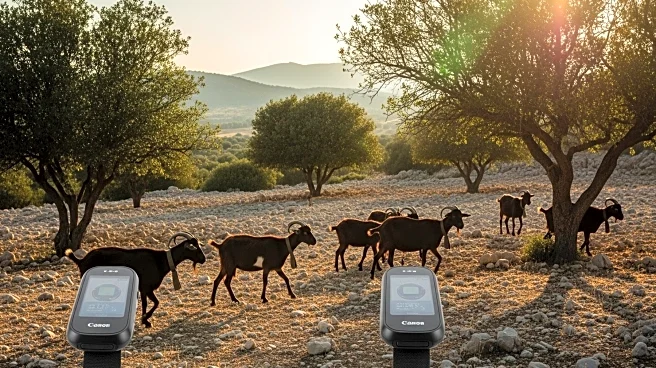What is the story about?
What's Happening?
The Department of Agriculture in Cyprus is piloting a selective grazing program using GPS-tracked goats to reduce wildfire risks in rural areas. This initiative follows a devastating wildfire in Limassol, which highlighted the need for innovative fire prevention strategies. The program aims to manage flammable biomass by increasing grazing activity, thereby reducing the accumulation of dry plant material that can ignite easily. The pilot project is currently underway in the Pyrgos Tillirias zone, with plans to expand to other regions by 2026. The project includes infrastructure for short-term animal housing and uses GPS collars to track animal movements, assessing the impact on vegetation reduction.
Why It's Important?
This initiative is crucial for enhancing the resilience of rural areas against wildfires, which are exacerbated by climate change and prolonged drought conditions. By reducing combustible vegetation, the program aims to prevent future fires and protect both ecological and economic interests. The use of GPS technology in agriculture represents a modern approach to environmental management, potentially setting a precedent for similar strategies in other regions facing wildfire threats. The program also supports the broader goals of the EU's Common Agricultural Policy, which seeks to sustain rural communities and address climate challenges.
What's Next?
The Department of Agriculture plans to evaluate the pilot program's outcomes and expand it to additional areas in 2026. The data collected will inform future strategies and potentially integrate the program into Cyprus's Strategic CAP Plan beyond 2027. The initiative may also lead to further innovations in agricultural practices, such as the use of plant residue for fire risk reduction. Continued collaboration with local livestock farmers and community councils will be essential for the program's success and broader implementation.
Beyond the Headlines
The program highlights the intersection of technology and traditional agricultural practices, offering a sustainable solution to environmental challenges. It also underscores the importance of proactive measures in disaster prevention, which can mitigate the long-term impacts of climate change on rural communities. The initiative may inspire similar projects globally, particularly in regions vulnerable to wildfires.
















